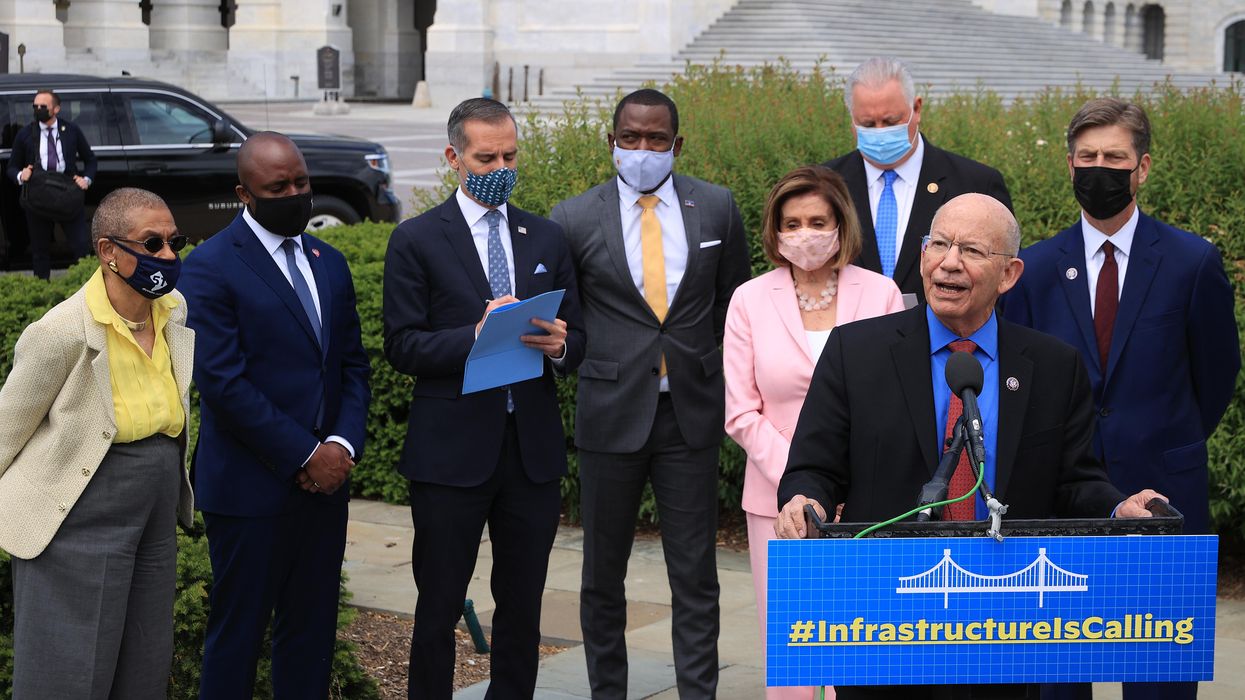Anderson edited "Leveraging: A Political, Economic and Societal Framework" (Springer, 2014), has taught at five universities and ran for the Democratic nomination for a Maryland congressional seat in 2016.
President Biden has proposed more than $4 trillion in new spending, about half for infrastructure and about half for family policies. The American Jobs Plan and the American Families Plan would provide massive transportation and communication infrastructure funding as well as major investment in subsidies for child care and paid parental and medical leave, universal pre-K, free community college tuition, and funding for other social programs.
Combined with the approximately $1.8 trillion stimulus package that was passed in February (the final amount is unclear since Democratic Sen. Joe Manchin of West Virginia led the effort to scale it down a bit), the total cost is in the $6 trillion range. Almost all Democrats say all of this spending is needed; almost all Republicans say it is not.
Our politics is so dysfunctional that communication from both sides of the aisle and from the traditional media, and social media, is very distorted. Probably half of the dysfunction in our democracy is due to a communication disorder. There is just too much misleading prose — too much spinning and bending and denying of the truth.
Take a prominent example. The $1.8 trillion stimulus package is for about one year. The $4 trillion is for long-term investments in the country's physical and social infrastructure. But these numbers are thrown around in such a way to make you think the $4 trillion is for one year, too.
The concept of infrastructure also needs to be clarified and indeed redefined. The concept of a "social" infrastructure has been advanced by New America CEO Anne-Marie Slaughter, who has written about the need for "an infrastructure of care" and who has acknowledged the influence of New York University feminist Carol Gilligan's landmark work on moral psychology and an "Ethics of Care."
A social infrastructure of care that includes child care and paid parental and medical leave and Democratic Sen. Kirsten Gillibrand's concept of home health care supplements traditional port-roads-bridges physical infrastructure as well as broadband communication infrastructure.
Social infrastructure concerns all of those core societal institutions that are necessary for society to operate efficiently and effectively. We need child care subsidies for families to function in the same way we need safe roads and bridges for parents to drive on when they go to work, shop and visit their families. Poor people need broadband so that they, like the rest of society, can work, shop and visit with families online as well as in person. Communication infrastructure is less intimately tied to the concept of care, but it is just as much about infrastructure as roads and bridges.
Most of the $4 trillion in Biden's two proposed bills is dedicated to projects that are five or eight or 10 years long. If you spend $4 trillion over the course of eight years, then you are spending $500 billion a year.
There is almost no discussion about the difference between the two patterns of spending: Roughly one-third is for one-time emergency funds (based on a Keynesian rationale), the $1.8 trillion stimulus package (which included $1,400 checks for over 85 percent of the public); and roughly two-thirds is for long-term physical, communication and social infrastructure projects.
Our federal budget is nearing $5 trillion a year. Biden is essentially calling for a 10 percent hike in the budget to serve the needs of all Americans, since the physical infrastructure helps us all, while the social infrastructure is focused on the poor, the working class and the middle class. Moreover, he wants to pay for the 10 percent hike with new taxes on corporations and the very wealthy.
This gross distortion in the dialogue about the $6 trillion also rests on an egregious assumption about the appropriation process. It assumes that a president and a Congress can institute spending plans five to eight to 10 years in advance.
Really?!
Certainly if Biden loses the White House and the Democrats lose control of both chambers of Congress in 2024, everything could be scrapped from this plan. Even in 2022 there could be changes if the Republicans take back the House and Senate.
In short, Congress cannot determine its spending eight years in advance in any firm way in the same way that a company or a family cannot. Companies can definitely set out a plan for revenue and spending for eight years, but their revenue plan may get trashed because competition in the market reduces their revenue by 40 percent or puts them out of business or we have a massive recession or depression and they have to radically cut back on their spending plan.
A family may also set out an eight-year plan, but one of the partners in the marriage may lose his or her job or the family may be radically changed due to death or divorce; likewise the family may suffer from the results of a natural or national financial disaster.
Make no mistake, it is prudent, indeed wise, for politicians, company executives and parents to outline long-term financial plans to meet their physical, communication and social needs. But politicians can at best get budget plans sealed in place for two years, and companies and families probably can really only get things sealed in place for one year.
The reality of budget planning and the appropriations process in Washington should not diminish in significance the progressive agenda of President Biden and almost all members of the Democratic Party. But talk of spending $6 trillion is grossly misleading when the new $4 trillion really comes in at about $500 billion a year for eight years; and it must be taken with a trillion grains of salt because no Congress with a presidential request can appropriate funds for eight years in any serious sense of the term "appropriate."




















